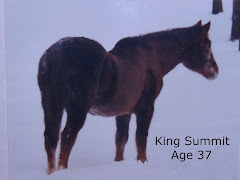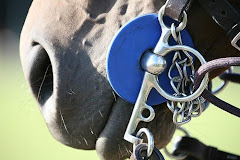
One of the many horse related expenses is veterinary care. It's a fact of life for any responsible horse owner. If for no other reason, there are always yearly immunizations and dental work. At some point in your horse owning life, your horse will probably require a vet visit for some other reason. Maybe colic, a laceration,or lameness. We have had our share of medical delemas this past year, especially the past 5 months. Zanita coliced, Alcott hurt his eye and Divine choked. When Divine choked, she had to be kept in a stall overnight for observation. In the morning, she was so excited to get out, that she broke away from me and ran around for about 5 minutes. I put her in the field, and about 2 hours later, noticed she wasn't putting any weight on her right front leg. She had a small wound about the size of a dime, on the outside of her knee. The vet was called, xrays were taken, and her knee was drained, medication was prescribed. The xrays showed little pieces of "something" near where the hole was. Three days in a row the knee was drained, and by Friday there was not much improvement. It was decided, after a suggestion of surgery, to wait one more week and see if there was any improvement. Just as things were starting to look better, Divine paniced about something and fell onto her knees. Vet was called again (after hours visit), and all the damage seemed superficial, but her lameness stopped improving. More xrays were taken, and these were sent to Tufts Veterinary Hospital to be read by a radiologist. A bone chip was seen, in addition to the little pieces of "something". Surgery was strongly advised. Divine is the sweetest horse, an outstanding polo horse, and 18 years old. There are no guarantees the surgery will allow her to play polo again, or even be comfortable as a pasture pet. We have already spent over $*000-oh, did I mention she choked a second time? What do we do? Surgery would be another $*000. After a week of going back and forth with the decision it was decided to take her to Tufts. My question to you is--How do you know at what point to stop treatment? Do you stop treatment? Once you get started it seems to snowball. Alcott is another example. When his injured eye was first examined, it seemed like a straight forward problem that would correct itself after a week of ointment. It has now been a month, and about $*000. If I had known it was going to cost so much would I have just euthanized him? Afterall, he is 27, retired from polo, not a good trail horse, and costs alot to feed because he has few teeth and can't eat hay! What are your thoughts? What would you do? While you ponder this question, I'm off to the bank to pick-up the paperwork to refinance our house!!






